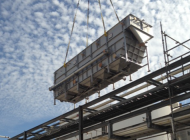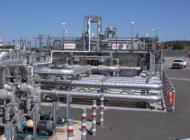Flotation Technology
Flotation technology for water and wastewater treatment
Dissolved Air Flotation (DAF) technology is an effective clarification method for low-density solids that sedimentation cannot remove in applications such as drinking water, process water, and wastewater treatment. With different flotation technologies and dissolved air flotation (DAF) clarifier models, our experts will take the time to provide the right solution for your particular water treatment requirements.
How flotation technology works
Solids are floated in the clarifier by chemical coagulation and flocculation, and by adding microbubbles. The microbubbles are created in an unpacked saturator which combines 8 to 15% recycle from the clarified water with compressed air. The pressurized air/water mixture is sent through a row of nozzles or special injector depending on the type of DAF technology. For some applications, nitrogen is used as the flotation gas.
A pressure drop brings the air out of solution and creates microbubbles, which adhere to the solids and float them to the top of the floatation zone. Clarified water is collected from the laterals at the bottom of the DAF.
Sludge is then either hydraulically removed over a stationary weir by raising the water level on a set interval, or mechanically removed with a scraper.


